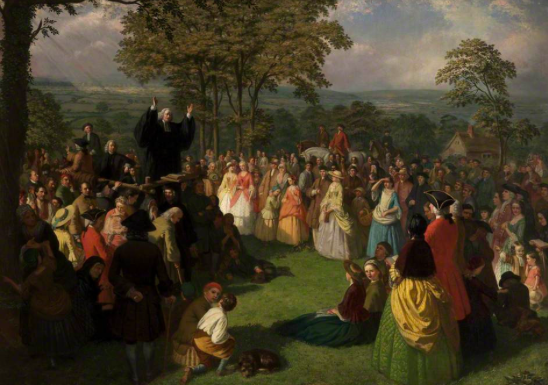
George Whitefield preaching
Will you not revive us again,
that your people may rejoice in you?
Psalm 85:6 ESV
I once heard someone remark that history does not move in straight lines. We imagine that there is either general progress or general decline, and that pleases or discourages us depending whether we think one or the other is happening.
For instance, we imagine that our culture is becoming steadily less Christian. This can cause trepidation or panic in believers (“look how few people go to Church!”, “Here are some sure-fire marketing techniques to attract and retain!”, “what about our young people?”). Or it can cause gloating arrogance in the decidedly non-believing (“look how few people go to church!”, “it’s the triumph of science!”, “down with silly, bronze-age myths!”).
The truth is that history indeed knows no straight lines. I once heard an offhand remark about American church involvement. I have no way of confirming but it did intrigue me. Around the time of the American Revolution (1776ish), only 17% of the population were involved in church life. That’s way lower even than today. But by the time of the American Civil War, about 90 years later, church-goers were almost 60%. No straight line of decline.
So what happened in between? A revival happened. A revival of Christian faith that changed the face of the culture. It can happen again. This ought to keep the gloating of the secularist in check. It should also encourage the believer who longs to see the world come to know God.
A little knowledge of Church history helps us to not be discouraged. Times for Christian faith have been worse off before. Read up on the 9th Century – it was arguably the most corrupt time in Christianity (for example) And low church attendance (a good indicator of Christianity’s health in a culture) has sometimes dipped. Apparently, on Easter Sunday, 17th of April, 1740 only 6 people were present for communion at St Paul’s Cathedral in London, England. (source – mention made at approx. the 17-19 minute mark). Times have been lean before. History knows no straight lines of decline or increase.
No one knows the future but God alone. But we do know that we must be – and, by God’s grace, can be – faithful witnesses in the times which we’re given to live in. And we can pray for God to “revive us again…”


